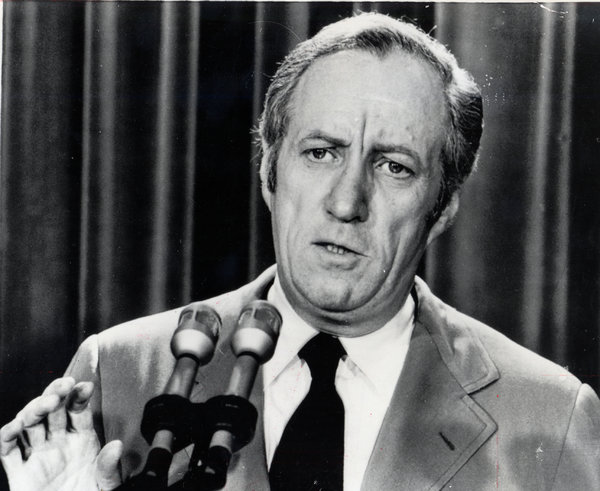Leonard Garment, former U.S. delegate to the United Nations, died on Saturday at the age of 89.
A Wall St. litigator, Garment served as special consultant to President Richard Nixon on domestic policy from 1969 to 1974. In the wake of the Watergate scandal, Garment took over in the position of Counsel to the President, left vacant by the resignation of John Dean.
Following Nixon’s resignation, Garment served as assistant to President Gerald Ford in 1974, when he was named U.S. representative to the United Nations Human Rights Commission, where he served until 1977. Garment also served as counselor to the U.S. delegation to the United Nations from 1975 to 1976.
Garment may have played his most significant role in fighting the U.N.’s infamous “Zionism is Racism” resolution.
The following is the statement by Garment, dated October 17, 1975, to the United Nations General Assembly’s 3rd Committee (Human Rights), on equating Zionism with racism and racial discrimination:
My delegation has read the new proposal before us. It is unusually straightforward. It asks to determine “that Zionism is a form of racism and racial discrimination.”
As simple as this language is, we are concerned that what may not be fully understood is that this resolution asks us to commit one of the most grievous errors in the 30-year life of this organization.
This committee is preparing itself, with deliberation and foreknowledge, to perform a supreme act of deceit, to make a massive attack on the moral realities of the world.
Under the guise of a program to eliminate racism the United Nations is at the point of officially endorsing anti-semitism, one of the oldest and most virulent forms of racism known to human history. This draft explicitly encourages the racism known as anti-semitism even as it would have us believe that its words will lead to the elimination of racism.
I choose my words carefully when I say that this is an obscene act. The United States protests this act. But protest alone is not enough. In fairness to ourselves we must also issue a warning. This resolution places the work of the United Nations in jeopardy.
The language of this resolution distorts and perverts. It changes words with precise meanings into purveyors of confusion. It destroys the moral force of the concept of racism, making it nothing more than an epithet to be flung arbitrarily at one’s adversary. It blinds us to areas of agreement and disagreement, and deprives us of the clarity of vision we desperately need to understand and resolve the differences among us. And we are here to overcome our differences, not to deepen them.
Zionism is a movement which has as its contemporary thrust the preservation of the small remnant of the Jewish people that survived the horrors of a racial holocaust. By equating Zionism with racism, this resolution discredits the good faith of our joint efforts to fight actual racism. It discredits these efforts morally and it cripples them politically.
The language of this resolution has already disrupted our efforts here to work together on the elimination of racism and it will continue to do so. Encouraging anti-semitism and group hostility, its adoption would bring to an end our ability to cooperate on eliminating racism and racial discrimination as part of the official work of the Decade.
Once again our failure to reason together has encouraged some delegations to exploit our collective shortcomings and individual vulnerabilities and impede our attempts to further the protection of human rights and fundamental freedoms.
The United Nations, throughout its 30-year history, has not lived by the force of majorities; it has not lived by the force of arms. It has lived only–I repeat, only–because it has been thought that the nations of the world, assembled together, would give voice to the most decent and humane instincts of mankind. From this thought has come the moral authority of the United Nations, and from this thought its influence upon human affairs.
Actions like this do not go unnoticed. They do not succeed without consequences, many of which while only imperfectly perceived at the time soon become an ineradicable part of a new and regrettable reality. Let us make no mistake: at risk today is the moral authority which is the United Nations’ only ultimate claim for the support of our peoples.
This risk is as reckless as it is unnecessary. But it is still avoidable.
Accordingly the United States will support resolutions A and B. We support, without reservation, the work of the United Nations to combat racism and racial discrimination. We have taken part in these vitally important activities in the past and want to be able to do so without obstruction in the future. We will vote against the third resolution. We call upon other delegations to do likewise.
On its adoption the third resolution becomes inseparably linked to the first two. Therefore, if all three are sent to Plenary the United States will vote against all three at that time.

COMMENTS
Please let us know if you're having issues with commenting.